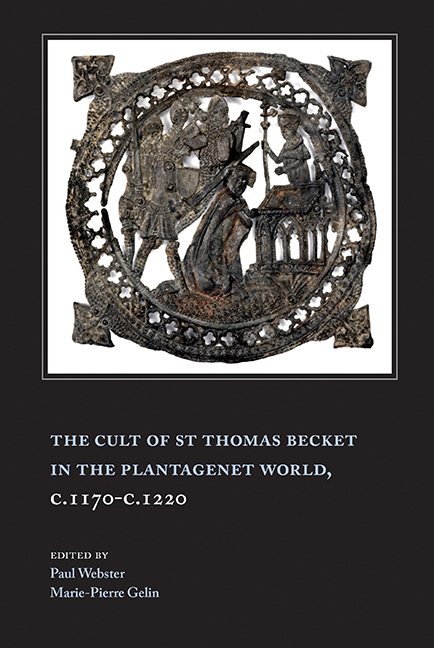Book contents
- Frontmatter
- Contents
- List of Illustrations
- List of Contributors
- Preface
- Acknowledgements
- List of Abbreviations
- 1 Introduction. The Cult of St Thomas Becket: An Historiographical Pilgrimage
- 2 Becket is Dead! Long Live St Thomas
- 3 The Cult of St Thomas in the Liturgy and Iconography of Christ Church, Canterbury
- 4 Thomas Becket and Leprosy in Normandy
- 5 Thomas Becket in the Chronicles
- 6 Matilda, Duchess of Saxony (1168–89) and the Cult of Thomas Becket: A Legacy of Appropriation
- 7 Leonor Plantagenet and the Cult of Thomas Becket in Castile
- 8 Crown Versus Church After Becket: King John, St Thomas and the Interdict
- 9 The St Thomas Becket Windows at Angers and Coutances: Devotion, Subversion and the Scottish Connection
- Bibliography
- Index
2 - Becket is Dead! Long Live St Thomas
Published online by Cambridge University Press: 25 October 2017
- Frontmatter
- Contents
- List of Illustrations
- List of Contributors
- Preface
- Acknowledgements
- List of Abbreviations
- 1 Introduction. The Cult of St Thomas Becket: An Historiographical Pilgrimage
- 2 Becket is Dead! Long Live St Thomas
- 3 The Cult of St Thomas in the Liturgy and Iconography of Christ Church, Canterbury
- 4 Thomas Becket and Leprosy in Normandy
- 5 Thomas Becket in the Chronicles
- 6 Matilda, Duchess of Saxony (1168–89) and the Cult of Thomas Becket: A Legacy of Appropriation
- 7 Leonor Plantagenet and the Cult of Thomas Becket in Castile
- 8 Crown Versus Church After Becket: King John, St Thomas and the Interdict
- 9 The St Thomas Becket Windows at Angers and Coutances: Devotion, Subversion and the Scottish Connection
- Bibliography
- Index
Summary
As Hugh of Horsea (nicknamed Mauclerc) scraped Becket's brains out on the paving stones in the north transept of Canterbury Cathedral on the fifth day of Christmas (29 December) 1170, he shouted to the barons who had just cut the archbishop of Canterbury down in his own cathedral, ‘Let's get out of here, knights, this one won't get up again.’ At that point, he can have had no inkling of what the future was to hold for his four baronial colleagues, the king in whose name they claimed to have acted and, of course, for the disparaged victim. Despite King Henry's best efforts to smother the story and assume the guise of injured innocence, the raw news was carried by an unknown messenger not only to the French royal court, but also to William aux blanchesmains, archbishop of Sens. The intelligence reached the French archbishop in time for him to summon a council of his province for Sunday, 24 January 1171, so that an appropriate response could be made. So it was that the details of Becket's murder were proclaimed before an assembly of bishops and abbots from the heartland of the French monarchy, and through them the news would have circulated rapidly through the various monastic and episcopal networks with which they were connected. Equally importantly, William of Sens executed the mandate of October 1170, in which Pope Alexander III ordered the imposition of an interdict on Henry II's continental lands (‘in tota terra ejus cismarina’) if the king failed to make good his undertaking at Freteval to restore the archbishop's estates as they had been before his departure. Normandy escaped the ban because, as Archbishop William explained to the pope, his colleague, Rotrou of Rouen, refused to impose the sentence in his own Norman province.
William's report, together with a personal letter and a dossier of protests from the French court, was then carried by two of Becket's clerks (Alexander of Wales and Gunther of Winchester) all the way through France to the papal court in Tusculum (Frascati), no doubt broadcasting the news to every town, bishopric and abbey through which they passed.
- Type
- Chapter
- Information
- Publisher: Boydell & BrewerPrint publication year: 2016



